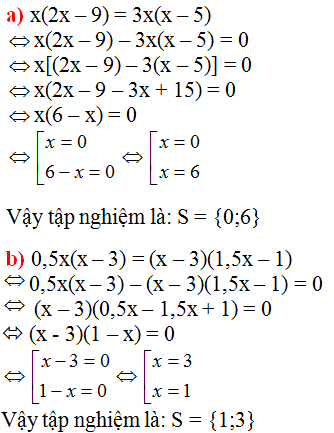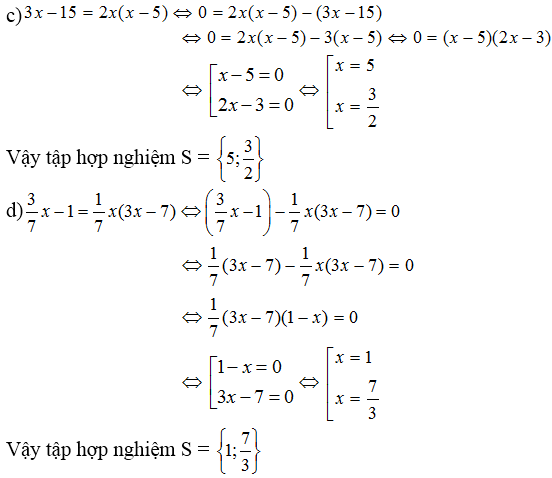
Hãy nhập câu hỏi của bạn vào đây, nếu là tài khoản VIP, bạn sẽ được ưu tiên trả lời.


a) \(\dfrac{x}{3}-\dfrac{2x+1}{2}=\dfrac{x}{6}-x\)
\(\Leftrightarrow\dfrac{2x}{6}-\dfrac{3\left(2x+1\right)}{6}=\dfrac{x}{6}=\dfrac{6x}{6}\)
\(\Leftrightarrow2x-3\left(2x+1\right)=x-6x\)
\(\Leftrightarrow2x-6x-3=x-6x\)
\(\Leftrightarrow2x-6x-x+6x=3\)
\(\Leftrightarrow x=3\)
\(S=\left\{3\right\}\)
b) \(\dfrac{2+x}{5}-0,5x=\dfrac{1-2x}{4}+0,25\)
\(\Leftrightarrow\dfrac{4\left(2+x\right)}{20}-\dfrac{10x}{20}=\dfrac{5\left(1-2x\right)}{20}+\dfrac{5}{20}\)
\(\Leftrightarrow4\left(2+x\right)-10x=5\left(1-2x\right)+5\)
\(\Leftrightarrow8+4x-10x=5-10x+5\)
\(\Leftrightarrow4x-10x+10x=5+5-8\)
\(\Leftrightarrow4x=2\)
\(\Leftrightarrow x=\dfrac{1}{2}\)
\(S=\left\{\dfrac{1}{2}\right\}\)

a: \(\Leftrightarrow\left\{{}\begin{matrix}x>=\dfrac{2}{3}\\\left(3x-2-2x\right)\left(3x-2+2x\right)=0\end{matrix}\right.\Leftrightarrow\left\{{}\begin{matrix}x>=\dfrac{2}{3}\\\left(x-2\right)\left(5x-2\right)=0\end{matrix}\right.\)
hay x=2
b: \(\Leftrightarrow\left\{{}\begin{matrix}x>=-\dfrac{10}{3}\\\left(-3,5x-1,5x-5\right)\left(-3,5x+1,5x+5\right)=0\end{matrix}\right.\)
\(\Leftrightarrow\left\{{}\begin{matrix}x>=-\dfrac{10}{3}\\\left(-5x-5\right)\left(-2x+5\right)=0\end{matrix}\right.\Leftrightarrow x\in\left\{-1;\dfrac{5}{2}\right\}\)
c: \(\Leftrightarrow\left\{{}\begin{matrix}x>=\dfrac{1}{3}\\\left(3x-1-x-15\right)\left(3x-1+x+15\right)=0\end{matrix}\right.\)
\(\Leftrightarrow\left\{{}\begin{matrix}x>=\dfrac{1}{3}\\\left(2x-16\right)\left(4x+14\right)=0\end{matrix}\right.\Leftrightarrow x=8\)
d: \(\Leftrightarrow\left|x-2\right|=0,5x-4\)
\(\Leftrightarrow\left\{{}\begin{matrix}x>=8\\\left(0,5x-4-x+2\right)\left(0,5x-4+x-2\right)=0\end{matrix}\right.\)
\(\Leftrightarrow\left\{{}\begin{matrix}x>=8\\\left(-0,5x-2\right)\left(1,5x-6\right)=0\end{matrix}\right.\Leftrightarrow x\in\varnothing\)

a: \(\Leftrightarrow\left\{{}\begin{matrix}x< =\dfrac{3}{2}\\\left(\dfrac{1}{2}x\right)^2-\left(2x-3\right)^2=0\end{matrix}\right.\Leftrightarrow\left\{{}\begin{matrix}x< =\dfrac{3}{2}\\\left(\dfrac{1}{2}x-2x+3\right)\left(\dfrac{1}{2}x+2x-3\right)=0\end{matrix}\right.\)
\(\Leftrightarrow\left\{{}\begin{matrix}x< =\dfrac{3}{2}\\\left(3-\dfrac{3}{2}x\right)\left(\dfrac{5}{2}x-3\right)=0\end{matrix}\right.\Leftrightarrow x\in\left\{\dfrac{6}{5}\right\}\)
b: \(\Leftrightarrow\left\{{}\begin{matrix}x>=-\dfrac{4}{3}\\\left(3x+4\right)^2-\left(2x\right)^2=0\end{matrix}\right.\Leftrightarrow\left\{{}\begin{matrix}x>=-\dfrac{4}{3}\\\left(5x+4\right)\left(x+4\right)=0\end{matrix}\right.\)
\(\Leftrightarrow x=-\dfrac{4}{5}\)
c: \(\Leftrightarrow\left\{{}\begin{matrix}x>=12\\\left(5x-x+12\right)\left(5x+x-12\right)=0\end{matrix}\right.\Leftrightarrow\left\{{}\begin{matrix}x>=12\\\left(4x+12\right)\left(6x-12\right)=0\end{matrix}\right.\)
hay \(x\in\varnothing\)
d: \(\Leftrightarrow\left\{{}\begin{matrix}x>=-\dfrac{10}{3}\\\left(2,5x-1,5x-5\right)\left(2,5x+1,5x+5\right)=0\end{matrix}\right.\)
\(\Leftrightarrow\left\{{}\begin{matrix}x>=-\dfrac{10}{3}\\\left(x-5\right)\left(4x+5\right)=0\end{matrix}\right.\Leftrightarrow x\in\left\{-\dfrac{5}{4};5\right\}\)

Đặt \(y=x^2-2x+3=\left(x-1\right)^2+2\ge2\), ta có:
\(x^2-2x+3=\frac{6}{x^2-2x+4}\Leftrightarrow y=\frac{6}{y+1}\Leftrightarrow y\left(y+1\right)=6\Leftrightarrow y^2+y-6=0\)
\(\Leftrightarrow\left(y+3\right)\left(y-2\right)=0\Leftrightarrow\orbr{\begin{cases}y=2\\y=-3\end{cases}\Rightarrow y=2\Leftrightarrow\left(x-1\right)^2=0\Leftrightarrow x=1}\)
Vậy \(S=\left\{1\right\}\)

Gợi ý :
Bài 1 : Cộng thêm 1 vào 3 phân thức đầu, trừ cho 3 ở phân thức thứ 4, có nhân tử chung là (x+2020)
Bài 2 : Trừ mỗi phân thức cho 1, chuyển vế và có nhân tử chung là (x-2021)
Bài 3 : Phân thức thứ nhất trừ đi 1, phân thức hai trù đi 2, phân thức ba trừ đi 3, phân thức bốn trừ cho 4, phân thức 5 trừ cho 5. Có nhân tử chung là (x-100)
bài 3
\(\frac{x-90}{10}+\frac{x-76}{12}+\frac{x-58}{14}+\frac{x-36}{16}+\frac{x-15}{17}=15.\)
=>\(\frac{x-90}{10}-1+\frac{x-76}{12}-2+\frac{x-58}{14}-3+\frac{x-36}{16}-4+\frac{x-15}{17}-5=0\)
=>\(\frac{x-100}{10}+\frac{x-100}{12}+\frac{x-100}{14}+\frac{x-100}{16}+\frac{x-100}{17}=0\)
=>\(\left(x-100\right).\left(\frac{1}{10}+\frac{1}{12}+\frac{1}{14}+\frac{1}{16}+\frac{1}{17}\right)=0\)
=>(x-100)=0 do \(\frac{1}{10}+\frac{1}{12}+\frac{1}{14}+\frac{1}{16}+\frac{1}{17}\ne0\)
=> x=100

b) \(x^4+x^3-3x^2-4x-4=0\)
\(\Leftrightarrow x^4+2x^3-x^3-2x^2-x^2-2x-2x-4=0\)
\(\Leftrightarrow x^3\left(x+2\right)-x^2\left(x+2\right)-x\left(x+2\right)-2\left(x+2\right)=0\)
\(\Leftrightarrow\left(x+2\right)\left(x^3-x^2-x-2\right)=0\)
\(\Leftrightarrow\left(x+2\right)\left(x^3-2x^2+x^2-2x+x-2\right)=0\)
\(\Leftrightarrow\left(x+2\right)\left[x^2\left(x-2\right)+x\left(x-2\right)+\left(x-2\right)\right]=0\)
\(\Leftrightarrow\left(x+2\right)\left(x-2\right)\left(x^2+x+1\right)=0\)
Vì \(x^2+x+1>0\forall x\)( cách c/m mình nói sau )
\(\Rightarrow\orbr{\begin{cases}x+2=0\\x-2=0\end{cases}\Leftrightarrow\orbr{\begin{cases}x=-2\\x=2\end{cases}}}\)
Vậy....
Cách chứng minh :
\(x^2+x+1\)
\(=x^2+2\cdot x\cdot\frac{1}{2}+\frac{1}{4}+\frac{3}{4}\)
\(=\left(x+\frac{1}{2}\right)^2+\frac{3}{4}\)
Vì \(\left(x+\frac{1}{2}\right)^2\ge0\forall x\)
\(\Rightarrow\left(x+\frac{1}{2}\right)^2+\frac{3}{4}>0\forall x\)
Hay \(x^2+x+1>0\forall x\)( đpcm )

Câu 1a : tự kết luận nhé
\(2\left(x+3\right)=5x-4\Leftrightarrow2x+6=5x-4\Leftrightarrow-3x=-10\Leftrightarrow x=\frac{10}{3}\)
Câu 1b : \(\frac{1}{x-3}-\frac{2}{x+3}=\frac{5-2x}{x^2-9}\)ĐK : \(x\ne\pm3\)
\(\Leftrightarrow x+3-2x+6=5-2x\Leftrightarrow-x+9=5-2x\Leftrightarrow x=-4\)
c, \(\frac{x+1}{2}\ge\frac{2x-2}{3}\Leftrightarrow\frac{x+1}{2}-\frac{2x-2}{3}\ge0\)
\(\Leftrightarrow\frac{3x+3-4x+8}{6}\ge0\Rightarrow-x+11\ge0\Leftrightarrow x\le11\)vì 6 >= 0
1) 2(x + 3) = 5x - 4
<=> 2x + 6 = 5x - 4
<=> 3x = 10
<=> x = 10/3
Vậy x = 10/3 là nghiệm phương trình
b) ĐKXĐ : \(x\ne\pm3\)
\(\frac{1}{x-3}-\frac{2}{x+3}=\frac{5-2x}{x^2-9}\)
=> \(\frac{x+3-2\left(x-3\right)}{\left(x-3\right)\left(x+3\right)}=\frac{5-2x}{\left(x-3\right)\left(x+3\right)}\)
=> x + 3 - 2(x - 3) = 5 - 2x
<=> -x + 9 = 5 - 2x
<=> x = -4 (tm)
Vậy x = -4 là nghiệm phương trình
c) \(\frac{x+1}{2}\ge\frac{2x-2}{3}\)
<=> \(6.\frac{x+1}{2}\ge6.\frac{2x-2}{3}\)
<=> 3(x + 1) \(\ge\)2(2x - 2)
<=> 3x + 3 \(\ge\)4x - 4
<=> 7 \(\ge\)x
<=> x \(\le7\)
Vậy x \(\le\)7 là nghiệm của bất phương trình
Biểu diễn
-----------------------|-----------]|-/-/-/-/-/-/>
0 7



